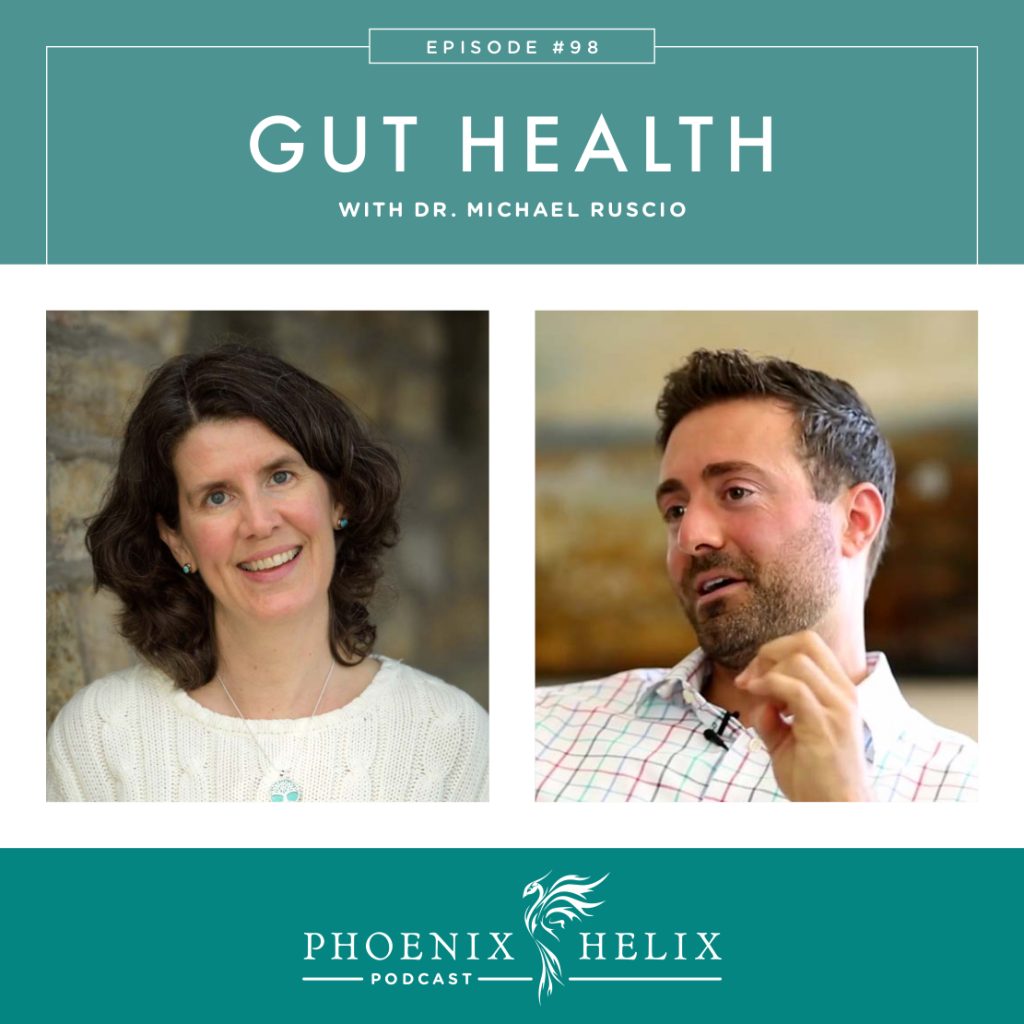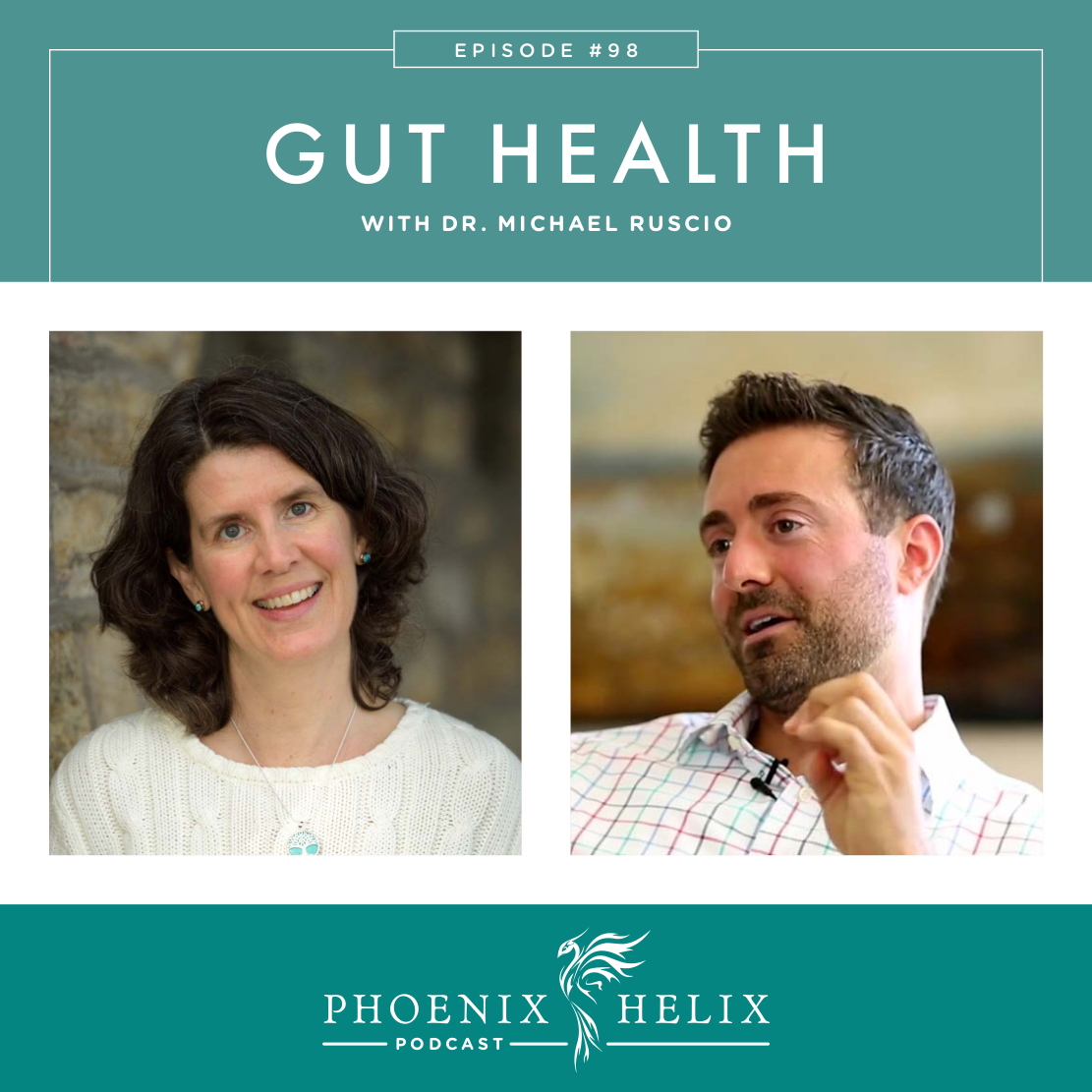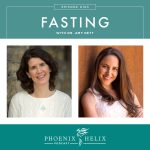
8 Steps to Gut Health
How do we lay the foundation for a healthy gut, and therefore a healthy body? When diet alone isn’t enough, what’s the next step? Do you have to work with a healthcare practitioner, or are there things you can try at home? In this podcast, Dr. Michael Ruscio answers these questions and many more. He is a functional medicine clinician, educator and researcher, specializing in digestive and autoimmune health. In his new book, Healthy Gut Healthy You, he outlines an 8-step protocol to gut healing.
Listen to the Show
- Subscribe to my podcast through your favorite podcast app: iTunes, Stitcher, Google, TuneIn, Spotify, Amazon, etc.
- You can also listen to the episode right here through the player below, and if you subscribe to my newsletter you’ll get notified of future episodes.
Podcast: Play in new window | Download
Show Notes
- Intro – Meet Dr. Ruscio (0:00)
- Dr. Ruscio is a clinician, educator and researcher, specializing in autoimmune disease and digestive health.
- He was originally trained as a chiropractor and now specializes in functional medicine. He has a clinical practice in California but consults with people around the world via Skype.
- Listen to his personal healing story in our first interview: Episode 42.
- Thank You to Our Podcast Sponsor: Real Plans (2:26)
- A meal planning app that’s an amazing time-saver. It can be used on a computer or smartphone.
- You choose the meals, and it generates shopping lists, defrost reminders, and how much time is needed to prepare and cook each recipe. They have hundreds of paleo AIP recipes available, and you can also personalize your meal plan according to your unique food needs, filtering for extra restrictions or adding foods back in with successful reintroductions. They also let you sort by budget, prep & cooking time, and season.
- Do you live outside the USA? In your settings, you can choose metric measurements.
- They offer a 30-day money-back guarantee for a no-risk trial. Sign up here.
- What’s Your Goal With This Book? (4:05)
- To give people an efficient method for improving their gut and overall health. The internet can be an overwhelming place, with so much information at our fingertips. How do we know which interventions are the most helpful, and in which order we should apply them?
- How is Gut Health Connected to Autoimmune Health? (6:16)
- The largest density of immune cells in our body are located in the small intestine. If this area is inflamed, the immune system is going to respond, including autoimmune activity in anyone with autoimmune disease. This is one of the reasons diet can be such a factor in autoimmune health. Similarly, correcting gut dysbiosis can lead to major improvements in autoimmune symptoms.
- What Is the Microbiome (or Microbiota)? (9:02)
- The microbiota is the world of bacteria, fungus and other microscopic life that occupies different regions of our bodies: the gut, the skin, the vagina, the mouth, the lungs, the urinary tract, etc. This book (and podcast) focuses on the gut, but all of these ecosystems are interlinked, and changing one often changes the others. When we are healthy, they have a symbiotic relationship with our body, both giving and receiving benefits.
- Resource: Ep. 133 The Gut Microbiome with Dr. Lucy Mailing.
- Step 1 – Reset (10:42)
- This is the diet and lifestyle piece that we discuss often on the podcast. It lays the foundation for health overall.
- A unique component of Dr. Ruscio’s protocol is that he starts everyone with a modified 2-4 day fast, using either bone broth or a “lemonade cleanse“. He does this because it gives the digestive system a chance to rest, and it’s also an opportunity to assess your body’s needs. People who respond well to fasting often find they do well with intermittent fasting as part of their diet going forward. People who do poorly with fasting might do better with mini meals throughout the day to keep their blood sugar stable. Note: The lemonade cleanse includes cayenne in the traditional recipe, which is a nightshade.
- What If You Have a Bad Reaction to a Step? (13:59)
- Often we see this as a failure, either of the intervention or of ourselves. But healing is about trial and error, and everything provides us with information. Sometimes it’s information about what is beneficial to us. Other times it’s information about what we need to avoid. People are very individual: what works well for one gut and one immune system might not work well for another. Approach your healing with a spirit of resilience and empowerment surrounding these learning opportunities.
- Does the Microbiome Affect Health or Is It the Other Way Around? (16:22)
- Some practitioners made the mistake of thinking if they fed a specific bacteria, it would improve the microbiota and therefore the health of the individual. Unfortunately, it’s not that simple. This was the “resistant starch craze.” Dr. Ruscio noticed that chronic health conditions often worsened with this approach. Instead, he saw that if you improve the health of the person, their microbiota will change to reflect that. Also, there is no one recipe for a “healthy” microbiome.
- We expect diet to impact the bacteria living in our gut (and it does). But lifestyle affects it as well, everything from stress to circadian rhythms to exercise.
- Step 2 – Support (20:44)
- If the diet and lifestyle changes don’t lead to desired improvements, Dr. Ruscio recommends adding some supplements to your routine
- Probiotics are one of these foundational supplements, and they fall into 3 categories. Since we’re all unique, you may react better to one type than another. Don’t feel that you “should” respond well to a certain type. This is an excellent self-experiment to find the category of probiotic that works for you:
- The Low Stomach Acid – Autoimmune Connection (23:44)
- If you have autoimmune disease or anemia, the chance of having low stomach acid is anywhere from 5% to 50%. The older you are, the higher your chances.
- For people with a history of ulcers (or a family history), HCL supplementation is contraindicated.
- Dr. Ruscio doesn’t recommend the common test of taking HCL supplementation until you feel a burning sensation in your stomach, and then reducing your dose by 1 capsule to determine your need. Nowhere is that verified in the scientific literature, and he believes this can be dangerous. For some people with a sensitive stomach lining, this can cause damage. For people with a healthy gut lining, they may never feel the burn and misinterpret that to mean their stomach acid is low when it’s not.
- He does recommend people try HCL in the book, but at a reasonable dose, and only take if you see benefits.
- When it comes to all supplements, the goal isn’t to take them forever. Step 7 in the protocol weans people off supplements to the minimum number needed.
- Step 3 – Remove (28:23)
- If after steps 1 and 2, you aren’t feeling 100% better. Dr. Ruscio recommends an anti-microbial protocol.
- He’s unusual among functional medicine practitioners, because he doesn’t feel it’s necessary to do any type of gut testing first. This is for two reasons: (1) Gut testing isn’t 100% accurate. (2) In his clinic, he has found the same herbs are effective at treating a wide variety of different gut infections: SIBO, h. pyrlori, candida, parasites, and more. This is because the herbs perform anti-fungal, anti-bacterial, and anti-parasitic actions, all at the same time.
- Thank You to Our Podcast Sponsor – Paleo on the Go (35:07)
- A frozen meal delivery service, 100% of their menu is compliant with the elimination phase of the paleo autoimmune protocol (AIP). They have over 5o items, including entrees, side dishes, broth, AIP-friendly bacon, and desserts.
- Use the code PHOENIX for 10% off your first order.
- Herbal Antibiotics vs. Pharmaceutical Antibiotics (36:18)
- When it comes to pharmaceutical antibiotics, the broad-action ones have more potential to have a negative impact on the microbiota than the localized ones. However, adults tend to have a more resilient microbiota (with less long-term negative impact) then babies and young children. That said, there is still a time they are needed and helpful for people of all ages. The decisions just need to be made judiciously.
- Dr. Ruscio believes herbal antibiotics carry less risk in terms of negative impact, but there is limited science comparing the two. The hope is that the benefit outweighs any potential negatives. With this in mind, he only recommends them if diet, lifestyle, and supportive supplements haven’t been enough to restore someone’s health.
- Step 4 – Rebalance (39:13)
- This step is paired with Step 3. After taking an herbal antimicrobial, Dr. Ruscio recommends a prokinetic supplement. This stimulates proper movement of food through your intestines and helps prevent recurrence of infections.
- Step 5 – Reintroduce (41:25)
- As we’ve mentioned frequently on this podcast, elimination diets like the AIP aren’t meant to stay in the “strict” phase forever. This step is where you learn how to safely expand your diet again. I have a whole series of articles and podcasts on this topic, to help guide people through the reintroduction process.
- In his book, Dr. Ruscio also shares a method for finding the right carbohydrate level for you. This is very unique to the individual. One person might do well at a ketogenic level, while another benefits from ample carbs at every meal. Note: gut infections can lower carbohydrate tolerance, which is why this is Step 5 in the protocol. Once those infections have healed, you can find your true optimal carbohydrate level (rather than one altered by poor gut health). For some people, this might still be low-carb. For others it might be higher-carb.
- Hadza Hunter-Gatherer Tribe (46:44)
- This tribe in Africa has recently been studied in terms of their diet, lifestyle, and resulting microbiota. They eat a very high-carbohydrate/high-fiber diet, and they have no virtually no chronic disease. Some people mistakenly took this information to believe we should eat like the Hadza to mimic their gut, and gain their health. Again, it’s not that simple. Their microbiota reflects their entire environment and lifestyle: They eat half the calories of a Western diet, they spend their entire life outside, they’re physically active throughout the day, they have no electricity or modern influences, they are exposed to health threats we no longer face (and aren’t exposed to modern ones), and their microbiota has evolved accordingly. Transplanting such a diet into a Westerner has vastly different consequences (and not necessarily positive ones).
- Resource: Do You Really Want a Hunter-Gatherer Microbiota?
- Step 6 – Feed (50:02)
- In this step, you test prebiotic supplementation (food for your micriobiota). Potential positives are improved digestion and blood sugar stabilization, among others.
- However, if you have a chronic health condition like autoimmune disease, you are more likely to experience negative consequences.
- Dr. Ruscio recommends trying it cautiously, to determine if you are someone who does receive benefits.
- Classifying Bacteria as Good vs. Bad (52:50)
- It’s not that black and white. It’s more about how your immune system gets along with the types of micriobiota that live in your gut. The same bacteria can be “good” for one person and “bad” for someone else (as discussed earlier in the podcast when we spoke of the Hadza).
- Also, density (how much of that bacteria is present) and behavior (whether that bacteria produces gas) will have different impacts on different people, depending on how sensitive the immune system is.
- Step 7 – Wean (55:18)
- In this step, you test going off your supplements and only continue taking the ones that show clear benefit. You want to get down to the lowest number needed to support your health.
- Step 8 – Maintenance and Have Fun (57:10)
- You are now experiencing good health and have the information you need to maintain it. Dr. Ruscio believes that enjoying life is important. It’s too easy to get caught in a chronic obsession with our health.
- Resource: Episode 97 – Prescription for Joy.
- Outro (57:25)
- You can connect with Dr. Ruscio through his website. He is accepting new patients. He also has a podcast, youtube channel, and his book is Healthy Gut Healthy You.
- Eileen (your podcast host) is the author of multiple books, written to help people thrive with autoimmune disease. Learn more on the Books Page.
- If you like this podcast, follow or subscribe through your favorite podcast app. You can also subscribe to Eileen’s biweekly newsletter.
- Check out the entire archive of podcast episodes.
You May Also Be Interested In
Spreading the Word
If you like the podcast, please leave a positive review in iTunes. It would mean the world to me, and also helps others find the podcast. Here are some quick instructions using your iPhone:
- If you are already subscribed to my podcast: (1) Click the purple podcast icon. (2) At the bottom of the screen, click Library. (3) At the top of the screen, click Shows. (4) Click the Phoenix Helix podcast image. (5) Scroll down the page, and you’ll see Ratings and Reviews. Scroll down a little bit more and click on Write a Review. This will bring up the review screen. Tap 5 stars (if you love the podcast), and then click in the title box, and it will bring up the keyboard. Enter a title and short review. (6) Click Send in the upper right corner. (7) Thank you! Positive reviews give the podcast a higher search ranking in iTunes, helping people find it and letting them know it’s a quality podcast and worth their time to listen.
- If you haven’t subscribed to my podcast: (1) Click the purple podcast icon. (2) In the lower right corner, click the magnifying class. (3) Type Phoenix Helix in the search box. (4) Click the podcast cover in the Show list. (5) If you’d like to subscribe, click the + sign at the top of the screen. (6) To write a review, scroll down the page, and you’ll see Ratings and Reviews. Scroll down a little bit more and click on Write a Review. This will bring up the review screen. Tap 5 stars (if you love the podcast), and then click in the title box, and it will bring up the keyboard. Enter a title and short review. (7) Click Send in the upper right corner. (8) Thank you! Positive reviews give the podcast a higher search ranking in iTunes, helping people find it and letting them know it’s a quality podcast and worth their time to listen.








